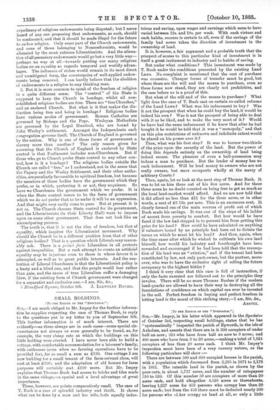SMALL HOLDINGS.
pro THE EDITOR OF THE "SPECTATOR."
SIR,—I am much obliged to Mr. Impey for the further informa- tion he supplies respecting the case of Thomas Bush, in reply to the questions put in my letter to you of September 8th. This further information is of much interest. There are evidently—as there always are in such cases—some special cir- cumstances not always or even generally to be found, as, for example, the very cheap rate at which the buildings on this little holding were erected. I have never been able to build a cottage, with comfortable accommodation for a labourer's family, with outhouses (even when no farming operations have to be 'provided for), for so small a sum as 2130. One cottage I am now building for a small tenant of the farm-servant class, will cost at least £300; and the adaptation of old houses for farm purposes will certainly cost 2100 more. But Mr. Impey explains that Thomas Bush had access to bricks and tiles made in the same village,—a special and a local advantage of great importance.
These, however, are points comparatively small. The case of T. Bush is a case of splendid industry and thrift. It shows what can be done by a man and his wife, both equally Indus-
trious and saving, upon wages and earnings which seem to have varied between 12s. and 19s. per week. With such virtues and such habits, success is certain to all, even if the savings of the family had never taken the direction of investment in the ownership of land.
It is, however, a fair argument and a probable truth that the prospect of access to this particular kind of investment is in itself a great incitement to industry and to habits of saving.
But under what conditions ? This investment was made by T. Bush under the conditions presented by the existing Land Laws. No complaint is mentioned that the cost of purchase was excessive. Cheaper forms of transfer must be good, but where there are the will and the means to purchase, even as these forms now stand, they are clearly not prohibitive, and the case before us is a proof of this.
Bat what of the will and of the means to purchase ? What light does the case of T. Bash cast on certain so-called reforms of the Land Laws P What was his inducement to buy? Was it not the prospect that when he could bay the land, it would be indeed his own ? Was it not the prospect of being able to deal with it as he liked, and to make the very most of it ? Would he have had the same inducement if he knew that after he had bought it be would be told that it was a "monopoly," and that on this plea restrictions of unknown and indefinite extent would be placed on his power over it ?
Then, what was his first step ? It was to borrow two-thirds of the price upon the security of the land. But the power of doing this depends entirely on the ownership of land being indeed secure. The pleasure of even a half-possession may induce a man to purchase. But the lender of money has no such inducement. Will he lend money to owners who are not really owners, but mere occupants wholly at the mercy of arbitrary Courts ?
Then, again, let us look at the next step of Thomas Bush. It was to let on hire three oat of his five acres. And for these three acres he no doubt counted on being free to get as much as the local land-market would afford. And we are now told that it did afford no less than 211 for the three acres, or in other words, a rent of 23 13s. per acre. This is an enormous rent. It clearly formed one of the main sources of profit out of which Bush made his savings. It was one of the steps of his ladder of ascent from poverty to comfort. But how would he have fared if the law had stepped in to prevent him from getting this price for his land ? How could he have calculated on anything if valuators bound by no principle had been set to dictate the terms on which he must let his land ? And then, again, when the time came after which be wished to cultivate his own land himself, how would his industry and forethought have been rewarded and encouraged if be had been told that the resump- tion of his land was an "eviction," and if the tenant had been constituted by law, not only part-owner, but the partner, more- over, who was to have the exclusive right of selling the future occupancy to the highest bidder P
I think it very clear that this case is fall of instruction, if only the facts narrated are followed out to the principles they involve. There will be no more Thomas Bushes if the modern land-quacks are allowed to have their way in destroying all the foundations of confidence on which capital can ever be invested in the soil. Perfect freedom in buying and perfect freedom in letting land is the moral of this striking story.—I am, Sir, 86c.,
ARGYLL.


































 Previous page
Previous page